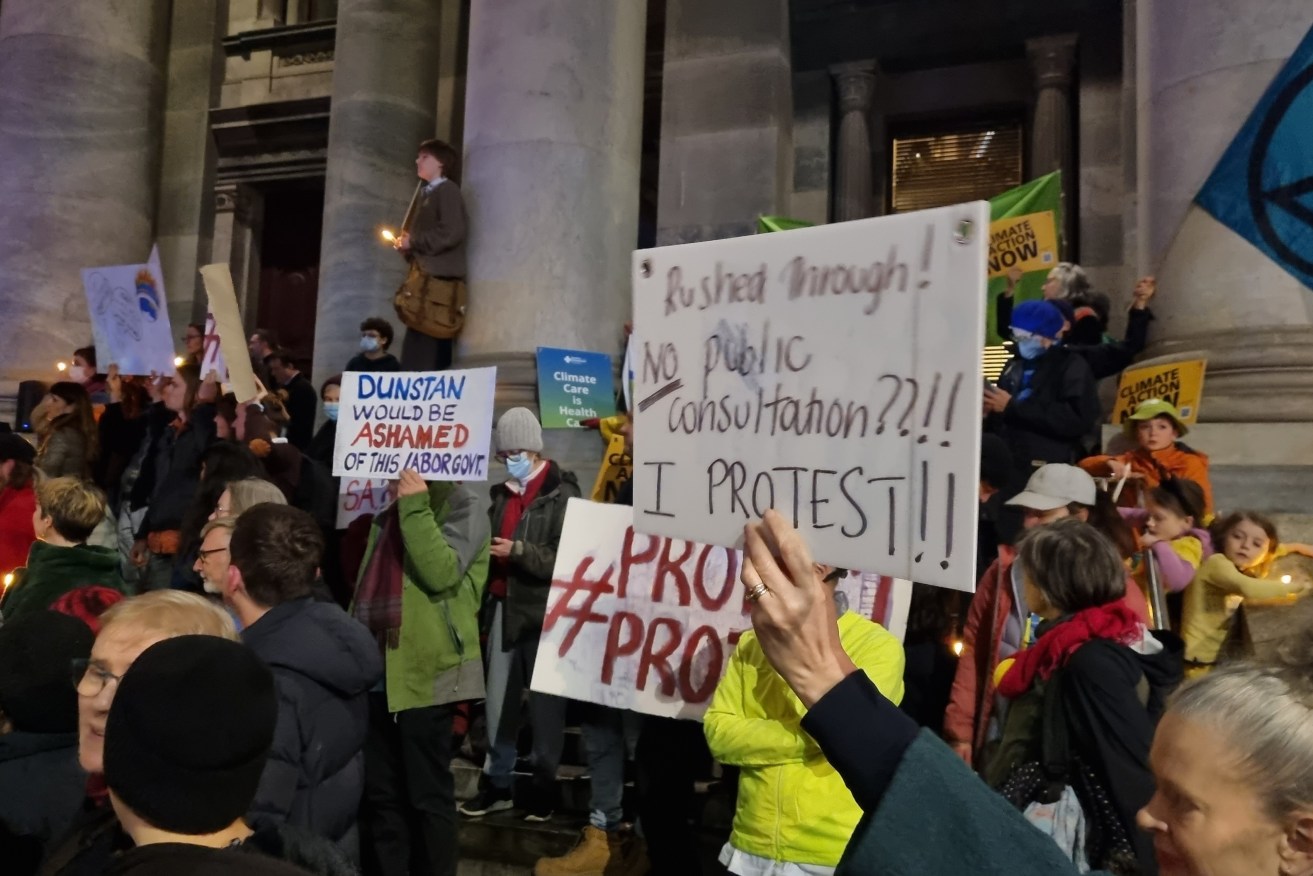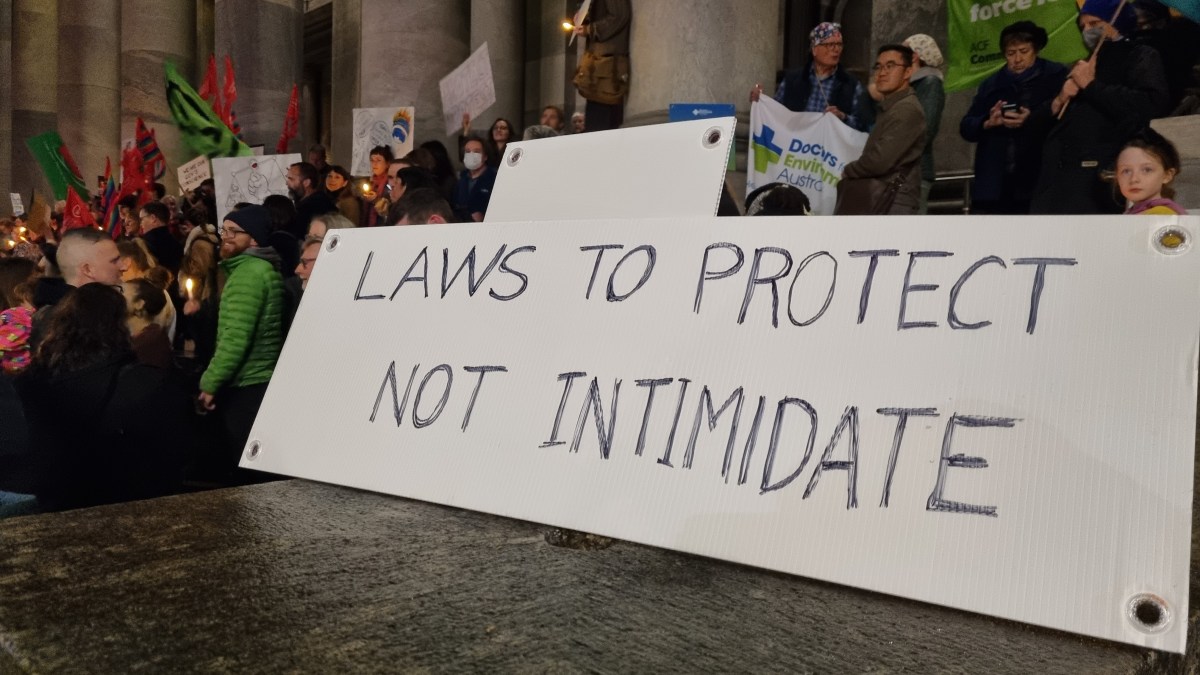‘Mind-blowing’: 22 minutes to ignore a century of Labor history
The Upper House will tomorrow consider Malinauskas Government legislation to massively boost penalties for disruptive protest and broaden the offence, after its high-speed passage through the Lower House. SA Unions secretary Dale Beasley says the “odious” Bill’s wording and intent stands against what the Labor Party has achieved – and how it achieved it.

A protest against Labor's protest penalties legislation on Friday night. Photo: Thomas Kelsall/InDaily
Life was tough for working people in the late 1800s. This was a time before the eight hour work day, when many people worked gruelling hours across six to seven days a week. There was no minimum wage, no Medicare or modern medicine, no social security, little education for working people, living conditions were cramped with no modern sanitation. For workers, the stakes were high.
The late 1800s were a time of mass demonstration and protest in South Australia; the Suffragettes, the eight hour day movement, the copper mine strikes for sanitary living conditions in the mid-north.
It was in those years that workers and their unions worked out that to win better pay and conditions, better safety at work and security for their families, they needed to be organised. They needed broad community influence and political influence.
So in January 1884, 13 unions came together at what is now the Franklin Hotel and formed the United Trades and Labor Council of SA. One hundred and thirty nine (and a half) years later and I am proud to be leading that organisation today.
But we didn’t stop there. In 1891, the United Trades and Labour Council of SA helped sponsor the creation of the South Australian Labor Party, beginning an enduring partnership designed to ensure working people had power and influence to win decent conditions in their workplaces, and decent laws in Parliament House.
The Labor party was born from the protest movements of the late 1800s, and the impact of those protests remain imprinted on our national consciousness. Every time you whistle Waltzing Matilda, remember that Banjo Patterson wrote that piece while staying at Dagworth Station in 1895, recounting the Great Shearers’ Strike of the 1890s.
The shearer’s strike began in Queensland in 1891 when employers sought to introduce a reduction in pay rates. They were backed to the hilt by the right-wing government of the day. The shearers stuck together for months. In Barcaldine more than 1300 came together to march in Australia’s first May Day rally. But repercussions were fierce. The strikers were literally read the Riot Act, and their leaders were arrested at bayonet-point. At Dagworth Station, a swagman was pursued by the authorities. But rather than be captured, he took his own life on the banks of a billabong.
The joint efforts and protests of the union movement and Labor Party has been the basis of the extraordinary social progress and change that’s been achieved since those times.
In 1916, while war engulfed Europe, Australia grappled with two referendums on whether to introduce conscription for overseas military service. The union movement united with ALP politicians in a massive protest campaign leading up to the referendums. The national secretary of the union campaign against conscription was John Curtin, future Labor PM.
In the 1970s, Australia was again gripped by dissent over our involvement in the Vietnam War and conscription. The resulting Vietnam moratorium protests would be the largest in our history at the time. Dr. Jim Cairns, the prominent Labor MP and deputy to Labor PM Gough Whitlam, was one of the leading figures of the anti-war movement.
Dr Cairns helped to organise giant moratorium marches, like those here in Adelaide where thousands of protesters occupied the streets and brought our city to a stand still. In our democracy, we use our rights to assembly and protest to confront and disrupt injustice. Disruption is the point.
Aside from disruption, protest is also about supporting people who have been wronged. In 1998 when the Howard government were chipping away at our workplace rights and took aim directly at waterfront workers, Kim Beazley visited the pickets regularly and supported the workers, as did other Labor MPs such as Simon Crean. Standing at the Fremantle docks, Beazley told gathered MUA members that he was there “to declare our support for your struggle to get your jobs back”. During the Waterfront Dispute, Labor stood with workers against greedy corporations and the protest crushing Howard government.
Today we take many of our democratic rights for granted, but it’s only by looking back that we are reminded that they did not always belong to us. And in the last fortnight we have been reminded by our own Labor government, that they can easily be taken away. In 22 minutes on the floor of the House of Representatives, no less.
With their anti-protest laws, the SA Labor government have put themselves at odds with their proud history of protest and demonstration
Through much of our state’s history, the union movement and Labor have celebrated the ability of people to bring about change and for the passionate engagement of active citizens to strengthen our society. We were the first to legalise the formation of Trade Unions in 1876; the first to sanction the right to vote for women, including Aboriginal women in 1894; the first to decriminalise homosexual acts in 1975; all advances borne out of protest and disruption.
This rich history is what makes the SA government’s recent Summary Offences Act Amendment Bill so odious. The Bill seeks to impose fines of $50,000 and three months gaol time on people who obstruct a public place. The Bill also introduces major changes which broaden the offence and cause what is currently lawful conduct to become unlawful.
The fact that this Bill does more than increase the penalties is clear to anyone who takes even a passing look. But don’t take my word for it, ask the Law Society and the SA Bar Association.

Photo: Thomas Kelsall/InDaily
In our society we must protect people’s right to safely enjoy public places, but we must also defend those same people’s right to be in those public places to safely protest and demonstrate.
I understand the politics of what went down last week when Extinction Rebellion protesters caused disruption in the city. I understand that people were inconvenienced, and some talkback radio callers wanted the government to act. But the government got their response wrong. They responded in haste and created an Amendment Bill which is a mess of overreach and unconsidered consequences.
As a result, the rushed laws (due to be pushed through the Legislative Council on Tuesday) would mean workers who stand up and take industrial action to achieve better pay, safety and rights at work risk facing crippling fines and gaol time.
Union members are the driving force in our country behind lifting pay. That job is so important for us to be doing after a decade of stagnant wages and now a cost-of-living crisis. It is mind-blowing that our Labor government is taking action which could stifle a unions’ ability to do that job. A Labor government which made a major pillar of their election campaign out of supporting union workers at rallies and demonstrations, much like Kim Beazley did in the 90’s.
That is why unions will be there demonstrating at Parliament House at 9am on Tuesday morning when the laws are to be introduced to the Legislative Council. Workers and unions will be there together with civil society groups, the conservation movement, legal and human rights experts.
Our growing chorus of community representatives and experts do not accept that in 2023, laws which dictate what people can and cannot do in our public spaces can be pushed through the House of Representatives with no community consultation in 22 minutes flat.
We want these laws deferred so there can be proper consultation with stakeholders about the impacts.
With their anti-protest laws, the SA Labor government have put themselves at odds with their proud history of protest and demonstration. Since coming to office, they have prided themselves on being a government which listens. Are they going to listen now?
Dale Beasley is SA Unions secretary.




